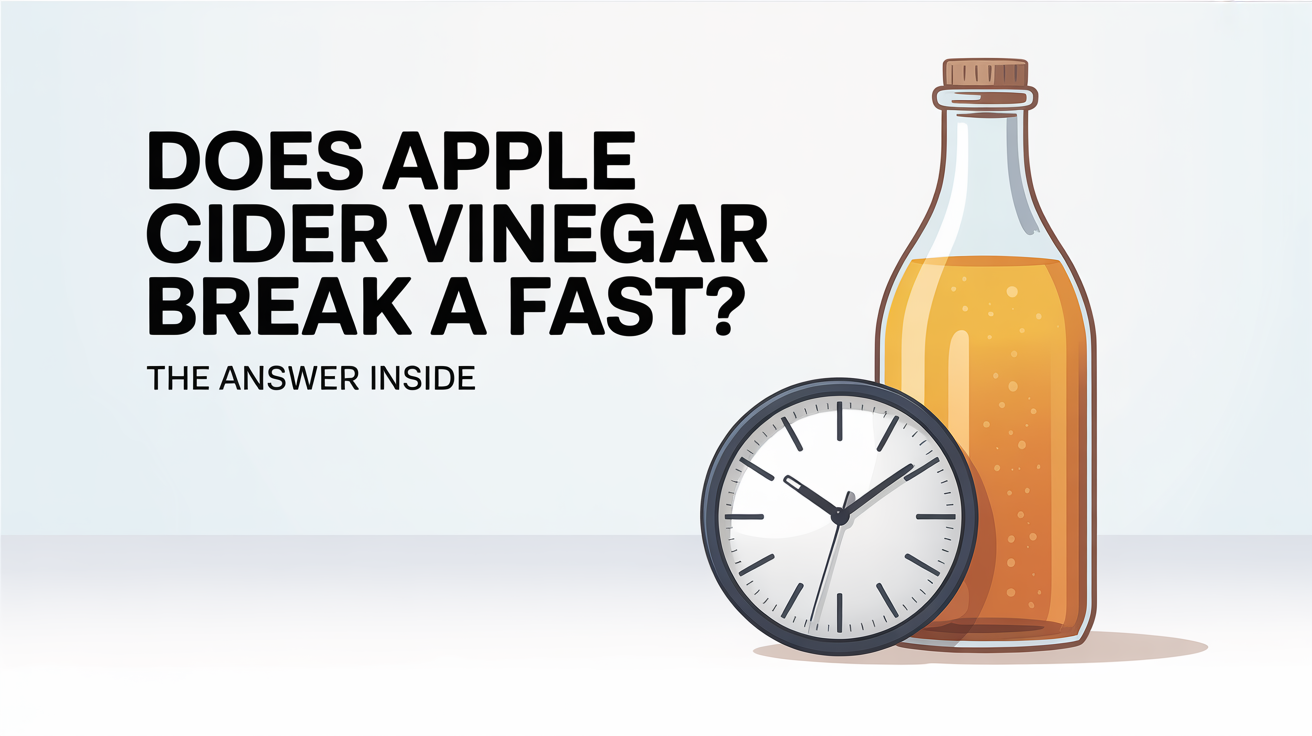You pour your morning coffee and reach for the cloudy bottle of apple cider vinegar. Just a splash in water first, you tell yourself. It’s sharp, cleansing, and feels productive. But mid-sip, you pause. Wait … does this break my fast?
It’s one of the most common fasting questions online, and like most things in nutrition, the real answer is “it depends.” How you take it, when you take it, and why you’re fasting all shape the outcome.
What to Know about ACV’s Calories and Effects on Our Bodies
A tablespoon of apple cider vinegar (ACV) contains roughly 0–3 calories. From a strict calorie standpoint, that’s negligible—you’re still in a fasted state.
It’s also acidic, not sweet, so it doesn’t directly spike blood sugar or insulin. In fact, research suggests vinegar can improve insulin sensitivity when taken with carbohydrate-rich meals. In one small study, participants who consumed vinegar before a high-carb meal had a significantly lower post-meal glucose and insulin response.
Still, “no calories” doesn’t mean “no effect.” The active compound in vinegar—acetic acid—influences digestion, slows gastric emptying, alters gut microbial activity, and may modestly affect appetite. So if you’re fasting for gut rest or deep metabolic repair, even tiny signals could matter.
Potential Perks That Are Backed by Research
Apple cider vinegar might be a calorie-free item to have in your pantry, but research shows there are numerous benefits if you decide to include this in your diet regularly—even if you fast.
1. Better Glucose Control
Multiple meta-analyses show that vinegar intake is associated with lower fasting glucose and modest improvements in HbA1c among adults with insulin resistance or type 2 diabetes.
A 2025 systematic review found consistent short-term improvements in glycemic markers when vinegar was added to the diet (Arjmandfard et al., 2025).
2. Slower Gastric Emptying
Acetic acid appears to delay stomach emptying, which blunts sharp post-meal glucose spikes and increases satiety. This mechanism was documented in a controlled study on vinegar ingestion and gastric motility.
3. Possible Weight Management Benefit
A meta-analysis of randomized controlled trials found short-term, small but statistically significant reductions in body weight among overweight adults who regularly consumed vinegar. Another review supported similar findings in lipid and glycemic parameters, calling vinegar a potential metabolic adjunct rather than a magic bullet.
4. Mindful Ritual
Beyond physiology, there’s a behavioral layer. Many fasters describe ACV water as a “commitment ritual”—something that signals discipline and replaces mindless snacking. That psychological anchor can improve adherence even if the biochemical effects are mild.
Risks and Precautions of Apple Cider Vinegar
While there are some benefits, you have to be mindful of the risks that you might run into with consistent use.
Enamel Erosion and Tooth Health
ACV’s acidity (pH ≈ 2–3) can erode enamel with chronic exposure. Always dilute it and, ideally, use a straw to limit contact with teeth.
Reflux and GI Discomfort
Taken on an empty stomach, vinegar can irritate the esophagus and stomach lining, especially in those prone to reflux. Start small or delay until your first meal if you notice burning or nausea.
Medication Interactions
ACV can amplify the effects of blood-sugar-lowering or potassium-depleting medications. A 2020 safety review documented cases of hypokalemia (low potassium) and bone mineral loss with long-term, high-dose vinegar intake.
If you take insulin, diuretics, or cardiac meds, make sure you clear ACV use with your doctor first.
Autophagy Purists
If your goal is deep autophagy or pure metabolic reset, even subtle digestive or hormonal cues might matter. In that case, skip ACV during the fasting window and keep the fast plain.
How to Use It (If You Choose To)
If you are going to take ACV as part of your fasting routine, here’s what we recommend:
- Dilute well: Mix 1–2 teaspoons (5–10 mL) in 8–12 oz (250–350 mL) of water.
- Protect teeth: Use a short straw and rinse with plain water after.
- Avoid before bed: Lying flat with acid in the stomach raises reflux risk.
- Ease in: If it causes stomach burning, take it right before your first meal instead of mid-fast.
- Don’t treat it as a “fast hack.” ACV is a support tool, not a shortcut to fat loss or autophagy.
Moderation matters more than ritual. Two teaspoons daily is plenty for most people.
It All Depends on What You Are Aiming to Achieve
- If Your Goal Is Weight Control or Adherence: A small, diluted shot of ACV is unlikely to break your fast in any meaningful way. It may even help curb appetite and stabilize energy until your first meal.
- If Your Goal Is Deep Cellular Repair: Skip it during the fast. Even minimal stimuli—acidic taste, gut motility, or hormonal shifts—could interrupt autophagic signaling.
In other words, ACV is fine for fasting for discipline and weight control, but not for experiments on cellular clean-up and insulin reset.
The Best Times to Take ACV for Your Fast
Mid-Fast (If Tolerated)
If you enjoy ACV and your stomach handles it, you can take it mid-fast to ease hunger or refresh the palate. Just note any changes in bloating or acid reflux.
Just Before Your First Meal
Ten to fifteen minutes before your first meal is ideal. That timing lets ACV assist gastric preparation and may reduce your post-meal glucose response. It also prevents most of the “acid on an empty stomach” problems some people get mid-fast.
So… Does Apple Cider Vinegar Break a Fast?
Technically, no. ACV doesn’t “feed” you in any meaningful caloric sense. Its energy content is trivial, and its impact on blood sugar is either neutral or slightly beneficial.
Functionally, though, it can create a light physiological response. If your definition of fasting focuses on metabolic purity, skip it. If your definition focuses on discipline and habit, use it wisely.
Either way, the goal is to stay consistent, not perfect.
Make It Personal with the Fasting App by Municorn
Want to see how ACV actually affects you? Use the Fasting App by Municorn to track your vinegar ritual—log when you take it, note hunger levels, energy, and any acid symptoms.
Compare ACV days vs plain fast days to see if your glucose, mood, or bloating changes.
Data beats guessing every time—and you’ll know whether that morning capful helps or hinders your fasting flow.




